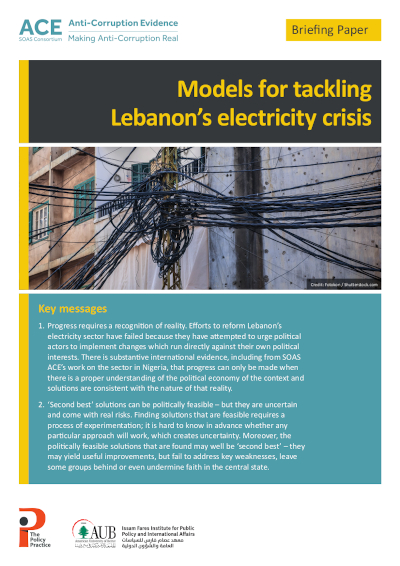
Publication Type: Briefing Paper
Countries: Lebanon
Authors: Ali Ahmad, Neil McCulloch, Muzna Al-Masri, Hassan Hrajli, Alix Chaplain, Jamil Moawad, Eric Verdeil, Pallavi Roy
Publication date: May 2021
Keywords: Electricity
Lebanon’s electricity sector is suffering severe challenges, with increasingly frequent and lengthy blackouts and a serious risk of the collapse of the entire system. The national electricity utility, Electricité du Liban (EDL), was already in a fragile financial situation, but this has been exacerbated by the severe economic crisis the country is experiencing. The confluence of banking, financial, social and health crises has resulted in the erosion of public confidence and a rapid deterioration of basic public services. The shortage of foreign currency means that the utility is unable to obtain equipment and spare parts for maintenance, while fuel supplies are also threatened. These factors compound the operational challenges of both EDL and private diesel generators, pushing citizens to seek alternative solutions.
On 4 February 2021, the Issam Fares Institute at the American University of Beirut (AUB), in collaboration with The Policy Practice (TPP) and the SOAS Anti-Corruption Evidence (ACE) consortium, hosted a webinar entitled ‘Models for tackling Lebanon’s electricity crisis’. This brought together experts from Lebanon and around the world to explore different strategies to address the country’s electricity challenges: from the decentralised model promoted by concessions such as Électricité de Zahle (EDZ), to the centralised government plan that advocates the expansion of thermal power generation. The discussion also examined the evolving role of renewable energy in both models and its adoption by a number of municipalities.
This briefing paper summarises the views of the key speakers and discussants. It draws together the key threads of the discussion – identifying the commonalities and the points of disagreement – and provides some tentative suggestions about the way forward for the sector.
Access the full webinar here.

